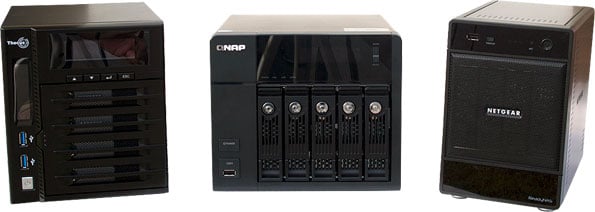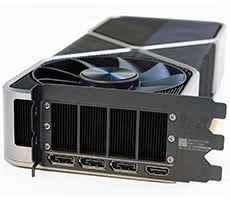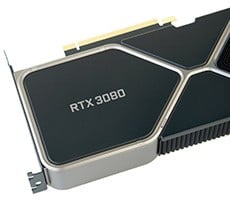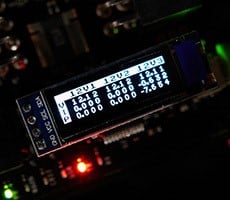Storage Wars NAS Roundup: Thecus, QNAP, Netgear
Introduction
Cloud-based storage solutions are all the rage these days, but if you don't want to trust your files to a third-party data center and deal with the risk of hacker attacks and unexpected downtime, maintaining your own centralized storage platform is the way to go. This is where network attached storage (NAS) devices come into play. With hard drive prices as cheap as they are, owning your own NAS box is a totally viable option for wrangling your data, automating backup routines, and serving up files to a growing number of connected devices, including tablets, notebooks, smartphones, game consoles, set-top boxes, and more. Plus, there are no monthly or annual subscription fees to deal with.
There are benefits for small and medium businesses (SMBs) too. Many of today's NAS boxes are loaded with IT friendly features that make it easy to access data and backup devices from remote locations. NAS boxes offer redundant protection without the risk of third-party cloud services, and in fact can be thought of as your own personal cloud, one that you're in complete control of. As your business grows, so can your storage architecture.
Convincing yourself you need or could benefit from a NAS box is the easy part. The hard part is in sifting through the seemingly million-and-one options out there and picking the best one for your needs. To help you do that, we reached out to a number of NAS vendors and asked them to send us their recommended NAS device for a 3-5 bay shootout. Three were willing to play ball.

The first NAS box we'll be looking at is Netgear's ReadyNAS Pro 4, a four-bay device the company sent pre-populated with quad Seagate Constellation ES 2TB hard drives for a total of 8TB. Like all three NAS boxes in this roundup, the ReadyNAS Pro 4 is essentially a server built around Intel's Atom platform designed to deliver affordable storage without the cloud subscription fees or the need for a dedicated IT staff. As configured, the ReadyNAS Pro 4 carries a hefty MSRP of ($3,499), though we've seen it street for as low as $1,509. Netgear's differentiating feature is the use of X-RAID2, which is the company's proprietary, auto-expandable RAID technology. We'll get into that in more detail later.

Finally, QNAP sent us its TS-569 Pro device. Like the other two, this one has a dual-core Atom processor tucked inside, but it's the only one of the three to bring five drive bays to this particular NAS party. Sans storage, a naked TS-569 Pro streets in the neighborhood of $1,000. Even though it's billed as a "high-performance 5-bay NAS server for SMBs," the product's price tag puts it within reach of high-end SOHO consumers looking for a compact centralized storage solution without having to roll their own machine.
On the following pages, we'll be taking a close look at each one's overall feature-set, ease of setup, backup routine, and performance. To help us do that, Western Digital provided us with four WD Red 3TB hard drives designed specifically for NAS applications. That's a lot of storage, but if we're going to do this thing, we want to do it right. Brace yourself folks, it's about to get NASty up in here.
There are benefits for small and medium businesses (SMBs) too. Many of today's NAS boxes are loaded with IT friendly features that make it easy to access data and backup devices from remote locations. NAS boxes offer redundant protection without the risk of third-party cloud services, and in fact can be thought of as your own personal cloud, one that you're in complete control of. As your business grows, so can your storage architecture.
Convincing yourself you need or could benefit from a NAS box is the easy part. The hard part is in sifting through the seemingly million-and-one options out there and picking the best one for your needs. To help you do that, we reached out to a number of NAS vendors and asked them to send us their recommended NAS device for a 3-5 bay shootout. Three were willing to play ball.


Next up is the Thecus N4800. It also features an Intel Atom dual-core processor, but wields 2GB of DDR3 instead of 1GB found in Netgear's device. The N4800 has four drive bays and shipped to us without hard drives. At around $630 street, it's the least expensive NAS box in this roundup, and also the only one that boasts HDMI output and a built-in mini-UPS in case of a power outage.


Finally, QNAP sent us its TS-569 Pro device. Like the other two, this one has a dual-core Atom processor tucked inside, but it's the only one of the three to bring five drive bays to this particular NAS party. Sans storage, a naked TS-569 Pro streets in the neighborhood of $1,000. Even though it's billed as a "high-performance 5-bay NAS server for SMBs," the product's price tag puts it within reach of high-end SOHO consumers looking for a compact centralized storage solution without having to roll their own machine.
On the following pages, we'll be taking a close look at each one's overall feature-set, ease of setup, backup routine, and performance. To help us do that, Western Digital provided us with four WD Red 3TB hard drives designed specifically for NAS applications. That's a lot of storage, but if we're going to do this thing, we want to do it right. Brace yourself folks, it's about to get NASty up in here.







